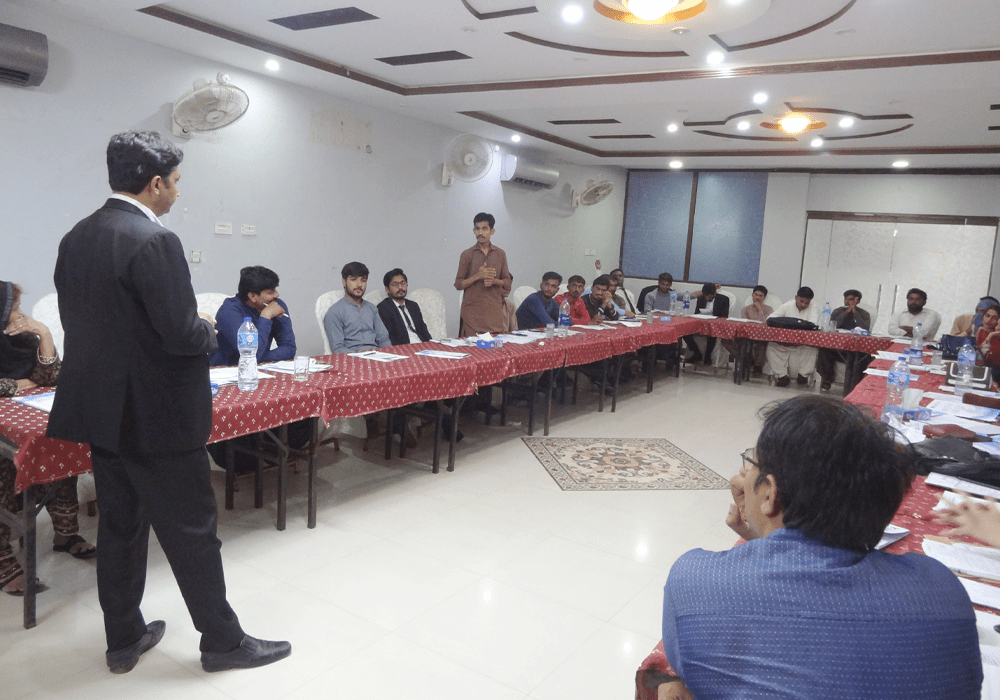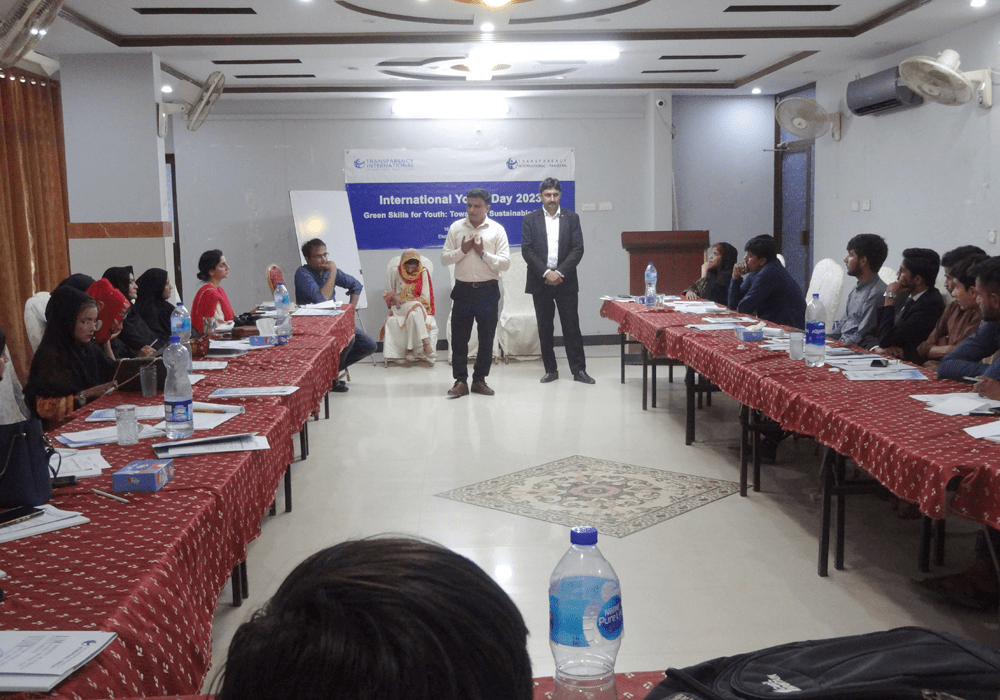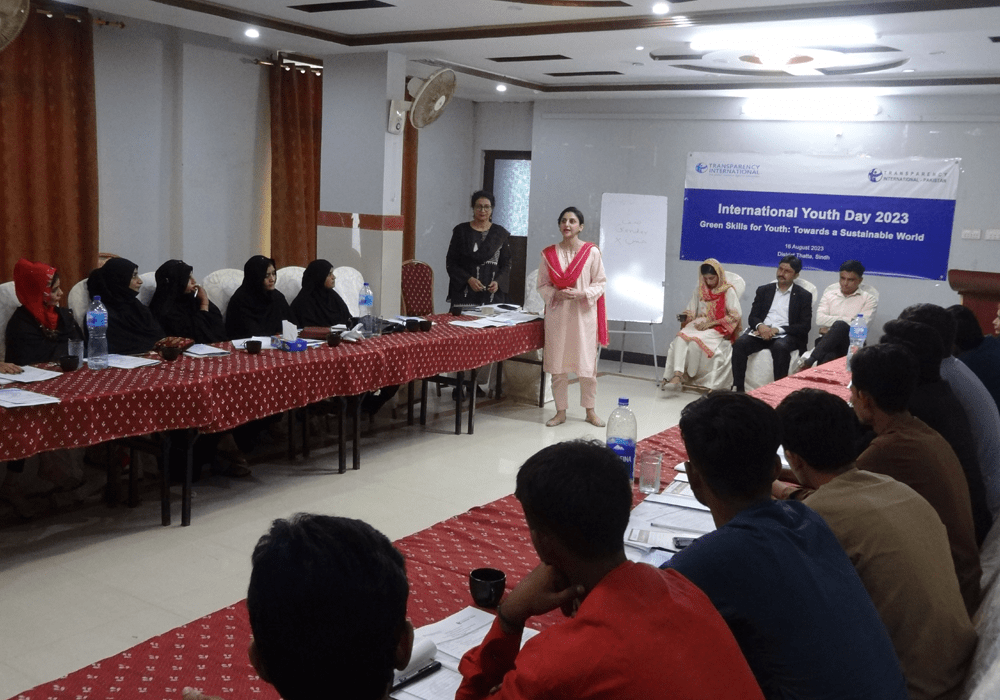- Home
- Workshop: International Youth Day 2023: Green Skills for Youth: Towards a Sustainable World
Workshop: International Youth Day 2023: Green Skills for Youth: Towards a Sustainable World
Workshop: International Youth Day 2023: Green Skills for Youth: Towards a Sustainable World
Venue: SRO Guesthouse, District Thatta, Sindh
Date and Day: Wednesday, August 16, 2023
Transparency International Pakistan celebrated International Youth Day 2023 by organizing training workshop for young people on IYD 2023 theme: Green Skills for Youth: Towards a Sustainable World, on August 16, 2023, in District Thatta, Sindh. The objective of the workshop was to ensure that young people are aware, empowered and skilled today for a sustainable future.
The workshop was attended by 40 young participants.
The workshop started with the recitation of the Holy Quran. Afterwards, Ms. Nasreen Memon, Gender Resource Person at Transparency International Pakistan, welcomed the participants and shared the objectives of International Youth Day 2023.
Mr. Ashfaque Ahmed, Project Coordinator at Transparency International Pakistan, gave a brief introduction of TI-Pakistan. He emphasized the significance of youth participation, both politically and economically, particularly during the ongoing climate and environmental challenges, ranging from heatwaves and environmental degradation to a high level of water shortage in various areas.
Focusing on the topic Green Skills for youth, Mr. Ashfaque shared the importance of green skills for youth. He highlighted that the majority of Pakistan’s population is youth, and without their active participation, the decision-making process in the country would be incomplete. Youth should focus on balancing the future needs and approaches to how they live in this crucial period and how they may shape their education, training, and employment in green skills—knowledge, abilities, values, and attitudes needed to live, develop, and support a sustainable and resource-efficient society.
Furthermore, he explained that it is estimated that the half of the world’s population is 30 years old or younger, and this figure is expected to reach 57 percent by the end of 2030. This is the largest generation of young people in history. This year’s International Youth Day highlights the importance of developing green skills for youth to ensure the success of a just transition to a greener and more sustainable world where all people, including young people, benefit equally. Green skills include technical knowledge, expertise, and abilities that enable the effective use of green technologies and processes in professional settings. Green competencies are of greater importance for younger people, who can contribute to the ecological transition over a longer period of time.
Unfortunately, the main challenge young people face in accessing green jobs is the lack of clarity on career paths and training resources, as well as the lack of mentoring or support systems to develop a green career. Young people need to be equipped with skills for the green economy so they can find decent jobs and make the world a better place for people and the planet.
After the tea break, the session resumed with interactive discussions among the youth groups.
Mr. Ali Muhammad, Coach of the Right To Play Organization, shared that we know that human-related causes of climate change are eroding the Earth’s ability to sustain life, resulting in a climate crisis. He encouraged young participants to start a youth climate movement to raise awareness about the effects of climate changes and work on its solutions.
Another youth, Mr. Kamal, a community activist, discussed that climate change is a burning issue. Often, young people are left out of conversations, and their voices are not taken seriously. As we believe, we all are responsible for saving our planet.
Mr. Tahir Baloch, a youth activist, suggested ideas to create youth climate change groups to address the climate issue through social media and awareness sessions. Furthermore, he said that youth do not have a decision-making power to work on climate change policies, so we have to involve with the concerned departments, civil societies, and environmental experts to work on the same cause.
After the productive session on “Green Skills for Youth,” young participants also enthusiastically engaged in interactive Q&A session with the speakers and suggested the following:
- Develop Youth Action Network on Climate Change.
- Youth should learn and review internationally best climate resilience policies and initiatives and help replicate the same at national, and local level.
- Review provincial climate change policy, compile and share it with relevant stakeholders for further advocacy.
- Climate change policy must be inclusive; and involve youth from different segments of society in policy and decision-making decisions.
- The topic of climate change should be discussed in different forums, debates, social media, print media, and electronic media.
Moving on, Ms. Nasreen Memon, Gender Resource Person, TI Pakistan spoke on the topic of Gender and Corruption, discussing different forms of corruption/gender inequality, and types of corruption faced by women, which directly affect women’s lives. She highlighted that corruption affects the marginalized and the poor population, restricting women’s participation in public, economic, and political life and limiting their influence over decision-making.
She suggested that both male and female members of youth groups should recognize their roles in addressing gendered forms of corruption. It is important to remember that the victims of corruption who are disproportionately affected, are females. Due to this reason, the inequality between men and women produced by gender and the social roles that make women more exposed to abuse of power, can expose them to a higher risk of falling victim to corruption.
After the session, youth named Mr. Moheed Memon, a young social media activist, shared his experience of consistently questioning media that portrays women incorrectly, especially in cases of violence against women and the sexual exploitation of girls and women. He advised youth that in this situation, we all collectively need to stop the negative portrayal of women and girls and request that social media share articles on women to prevent gender-based corruption.
Afterward, the next Speaker was Mr. Farhan Ahmed, Advocate District Court Thatta, gave a brief introduction of the Sindh Right to Information Act 2017 and explained the process of using the right to information. He explained how citizens can access information from public departments under the RTI law. Additionally, he highlighted that under Article 19-A of the constitution, any citizen of Pakistan can request information from government department by submitting a written request to the Public Information Officer (PIO) of the concerned department on plain paper. According to the law, every department is required to designate a Public Information Officer (PIO) and provide the required information in writing to the citizen within 14 to 28 days.
Moving on, the next speaker was Ms. Madiha Jhakro, Youth Ambassador of the Generation Amazing Program at Right To Play Organization. She emphasized on the topic “Leadership skills and the role of youth in promoting transparent &inclusive governance.” She spoke about different types of leadership skills that students need to become better leaders in the future. She emphasized integrity, moral values, and ethics, and encouraged students to empower themselves to become influential and impactful individuals in their respective spheres.
Afterwards, Ms. Faiza Mubarak, Assistant Project Coordinator, TI Pakistan highlighted the significance of Advocacy and Legal Advice Centers, where Transparency International Pakistan consistently offers legal counsel to individuals who are victims or witnesses of corruption. She detailed the process through which these complaints are handled, processed, and subsequently analyzed to seek redress for the citizens. Ms. Faiza urged the youth to actively participate and assist others in accessing public information while holding institutions accountable. Furthermore, she engaged young participants by motivating them to share their insights on collective strategies to control and mitigate corruption. A brief question-and-answer session followed, allowing for an interactive exchange of ideas.
Towards the end, Ms. Nasreen Memon concluded the workshop and thanked the participants. The participants appreciated TI Pakistan for the informative session on the most burning issue of climate change. Training certificates were also given to the participants.






